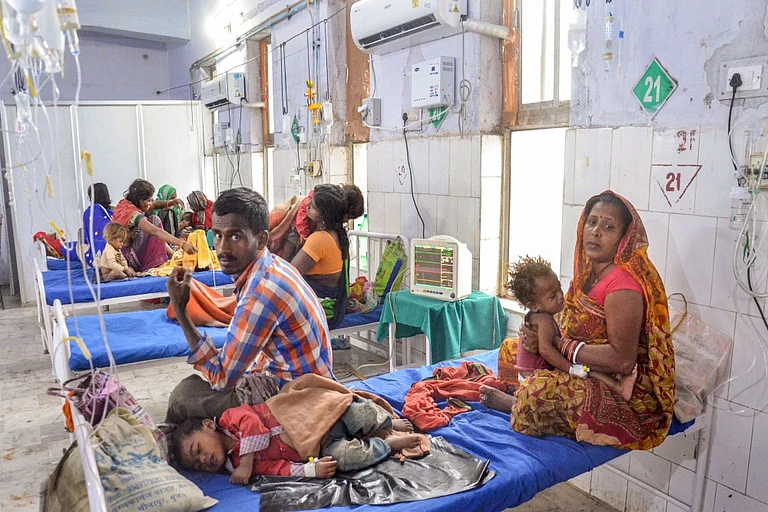The World Health Organization (WHO) has said that Covid-19 continues to be a "global health emergency" even as President Joe Biden has declared the US national and health emergencies over Covid-19 would end in May.
The WHO said the SARS-CoV-2, the virus that causes Covid-19 disease, will remain a "permanently established pathogen" in humans and animals for the foreseeable future.
The WHO declared Covid-19 as a global health emergency on Januaru 30, 2020. The United States declared national and public health emergencies in March and April 2020 respectively. Both the US emergencies will end on May 11.
The Biden administration's declaration and the WHO clarification come at a time when Covid-19 cases have fallen to minimal in a very long time and there are conversations whether Covid-19 is a global pandemic or has turned endemic.
Here we explain what's the WHO's global health emergency, what the WHO has said, and what are the different levels of disease outbreak.
What's WHO's global health emergency?
The formal designation of the WHO for what's commonly called 'global health emergency' is public health emergency of international concern (PHEIH).
The WHO defines it as: "An extraordinary event which is determined to constitute a public health risk to other States through the international spread of disease and to potentially require a coordinated international response."
The WHO definition adds that the global health emergency implies the situation is:
- serious, sudden, unusual or unexpected;
- carries implications for public health beyond the affected State’s national border; and
- may require immediate international action.
What has WHO said?
WHO Director-General Tedros Adhanom Ghebreyesus said on Monday that as the world enters the fourth year of the Covid-19 pandemic, there is no doubt that "we are in a far better situation now" than a year ago when the Omicron wave was at its peak. He said Covid-19 continues to be a health emergency.
He said, "Three years ago today, I declared a public health emergency of international concern over the global spread of Covid-19 – the highest level of alarm under the International Health Regulations, and for the moment, the only level of alarm."
Ghebreyesus said he has been advised by the Emergency Committee for coronavirus disease that "Covid-19 remains a global health emergency".
The Committee acknowledged that the Covid-19 pandemic may be approaching an “inflexion point”.
It said, "Achieving higher levels of population immunity globally, either through infection and/or vaccination, may limit the impact of SARS-CoV-2 on morbidity and mortality, but there is little doubt that this virus will remain a permanently established pathogen in humans and animals for the foreseeable future."
It noted that while eliminating the virus from human and animal reservoirs is highly unlikely, mitigation of its devastating impact on morbidity and mortality is achievable and should continue to be a "prioritised goal".
Weekly Covid deaths rising since December: WHO
WHO cheif Ghebreyesus cautioned that since the beginning of December, weekly reported deaths have been rising and in the past eight weeks, more than 170,000 people have lost their lives to Covid-19.
"We can’t control the virus, but we can do more to address the vulnerabilities in populations and health systems,” he said, adding that this means vaccinating 100 per cent of the most at-risk groups.
It also means increasing access to testing and early antiviral use; taking context-specific measures when there is a surge in cases; and maintaining and expanding laboratory networks.
However, Ghebreyesus did not highlight that contrary to the initial phase of Covid-19 when many countries were having simultaneous severe outbreaks, now the outbreaks are limited to countries, such as in China where hospitals even in largest cities of Beijing and Shanghai have overflowed with the sick in recent weeks. In contrast, the daily new cases have been down to a few hundred in India.
The United States has already announced an end to national and public health emergencies. Experts have said that Covid-19 is now endemic.
Pandemic, epidemic, endemic: What do they mean?
The three words —pandemic, epidemic, endemic— refer to how widespread a disease is. It does not refer to the severity of the disease or outbreak.
Broadly, a pandemic is a situation in which a disease has spread across countries and continents, often at a very fast speed.
The WHO lists six stages in the growth of a disease as a pandemic. The reaching of the last stage means we are in a pandemic.
- A virus circulates among animals not known to spread the disease to humans.
- The virus is found in animals known to have spread diseases to humans.
- Animal-to-human contact causes a human to develop the disease.
- Human-to-human contact makes it clear a community outbreak could happen.
- Human-to-human spread happens in at least two countries in the same region.
- Community level outbreaks happen in a third country in another region.
Broadly, an epidemic is a condition where a disease has spread to a certain large-enough region but not across continents or far-off continents. The example would be 2014-16 Ebola outbreak in West Asia or any outbreak that might spread through South Asia but not to the larger world.
The endemic is a little more complex to understand. While pandemic and epidemic are clearly about the scale of disease spread, the endemic stage is one where it's about the prevalence of the disease. It means that the disease is always there within a particular area or a population.
"A disease outbreak is endemic when it is consistently present but limited to a particular region. This makes the disease spread and rates predictable. Malaria, for example, is considered endemic in certain countries and regions," notes the Mailman School of Public Health.
A Wellcome Trust graphic hels understand it better.
What does Covid-19 becoming endemic mean?
The WHO has hinted that the Covid-19 will eventually become an endemic disease. The WHO said the SARS-CoV-2, the virus that causes Covid-19 disease, will remain a "permanently established pathogen" in humans and animals for the foreseeable future.
The Covid-19 being endemic would mean that the disease is already there but it would be manageable and limited in its prevalence and spread, like any many other diseases such as malaria and dengue in some parts of the world.
The different parts of the world will transition out of the pandemic stage at different rates as their public health responses, healthcare capacity and quality, and severity of disease will be different.
But even the transition to endemic stage would not mean the 'end' of Covid-19. The Covid-19 will never 'disappear'.
Healthline notes, "During the outbreak of the Ebola virus in West Africa in 2014, community health efforts were able to stop the spread of the virus and end the epidemic before it spread globally. That is not the type of expectation anyone should have for Covid-19. The most likely outcome of the COVID-19 pandemic is that the virus transitions to endemic status, not that it disappears entirely."
It further notes that the precautions would become part of everyday life.
Healthline notes, "Endemic COVID-19 may translate to continued mask wearing in places like public transportation, indoor settings, and offices. This may be especially important during wintertime peaks, when respiratory viruses like SARS-CoV-2 are easier to transmit.
"But with good community efforts, high vaccination rates, and improved treatments, COVID-19 can potentially become a predictable disease that communities can cope with, much as they do the seasonal flu."
(With PTI inputs)


























